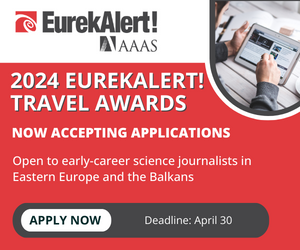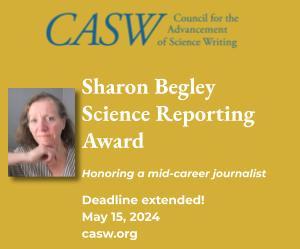The NASW Executive Board has been actively chatting about many things via our email group. The biggest news has already been communicated: the change in running for the board and the officer succession, which President Lee Hotz discusses in the upcoming issue of ScienceWriters.
The best news, first
Within the last few days, Board member Beryl Benderly reported to the board that, cybrarian Russell Clemings and Executive Director Tinsley Davis did a wonderful job compiling all the information from the Author's Coalition Survey. The response rate was 67%, which is well above the 60% that we need to get the maximum payments to which we are entitled. And, earlier this year, Beryl reported we were due to receive a check for $13,000.
Keeping the info flowing
There is an ongoing, multi-month (and dozens of posts) discussion on a policy by Conference on Retroviruses and Opportunistic Infections (CROI) about coverage of papers presented at their annual meeting (the 2008 meeting was Feb. 3-6 in Boston). They prohibit any institution from distributing news or news releases about research presentations until after the meeting ends. Reporters attending the meeting may report on data once it has been presented. The meeting is attended by more than 4,000 scientists representing hundreds of academic institutions and industry. This year, 110 reporters were credentialed.
Board member Kelli Burton wrote:
"I spoke with Mark Aurigemma, manager of media relations for CROI. The policy, which has existed since the first CROI meeting 15 years ago, was originally conceived because conference organizers wanted to keep the pharmaceutical industry and stock advisers from reporting on data and/or harassing conference attendees. Limiting the no-release policy to industry only proved problematic so they apply it to everyone. While Mark has received complaints about the policy from university and government PIOs and industry PR people, he hasn't received any negative feedback from reporters.
As for enforcement, if an institution distributes a news release in violation of the embargo, Mark contacts that news office to explain CROI's policy. In most cases, institutions weren't aware of the restrictions. However, if a PIO is aware of the policy and sends out a release anyway, the case is reviewed by the CROI Program Committee. Actions could include a letter to the news office and all conference attendees from that institution. In the most egregious cases, CROI could refuse to accept abstracts from that institution. They have not done this in the past five years."
Board members expressed their outrage. Here's a typical post, this one from Board member Tom Paulson:
"I think NASW should protest this policy because it inconveniences our journalist members and our PIO members, but mostly because the policy inhibits the free flow of scientific information. It's an inequitable policy that doesn't seem to make sense, unless the goal is simply to give an advantage to reporters attending the meeting. If I can talk to the presenting scientists by telephone on the same day they present data, why am I prevented from reporting the story until after the meeting closes? Why should I have to be physically present at the meeting? Is anyone aware of any other org that takes this embargo approach? "
We agreed that, in addition to our verbal objections, NASW would send a formal letter to CROI strongly opposing this policy as it hurts anyone who isn't the meeting, Public Information Officers and journalists alike. We hope to draft the letter soon.
Encouraging science writing careers
We had a lengthy discussion about a request from SACNAS (Society for Advancement of Chicanos and Native Americans in Science), wondering if we would be interested in having a booth and/or a panel of science writers to "talk about science writing as a career, how to enter it, any special issues of being a minority person," at the their annual meeting in Salt Lake City in October. We agreed that a booth was not the best investment of our time and money. We resolved it by suggesting names of appropriate science writers who might be willing to talk at the meeting and deciding to spend $750 to defray a speaker's travel expenses. We also will send NASW brochures to be distributed at the meeting.
Debating a debate endorsement
There was, as they say in the political world, "a lively and frank exchange of views" on the issue of whether NASW should support the Presidential Science Debate proposed by a number of prominent scientists, institutions and scientific organizations. Some on the board wanted us to be on record supporting/encouraging the idea, believing it is in our mission to support better public understanding of science and more access to scientific policy discussions. Other members disagreed, believing that NASW does not belong in the political process in this way, as it puts us on the side of certain scientists and organizations we cover. In the end, we did not send a letter of support and anyone who wanted to was encouraged to send one personally, as a member of NASW, but not representing the group.
Freelance committee request considered
The Freelance committee members unanimously requested funds to hire a website editor at $4800/year (8 hours/month) for regular editing services associated with keeping the freelance web pages fresh and valuable to the membership. Tinsley and Beryl reminded the board that we are prohibited from using Author's Coalition funds for salaries. So we turned down the request to hire an editor. The committee had been authorized two years ago to spend up to $2,400 on articles of interest from attorneys, tax accountants, but has not yet done so.
Until next year ...
Board member Robin Henig had the lovely idea of an NASW presence at the World Science Festival, in New York. Here's Lee's report of what happened next:
Robin, Mariette [NASW's Vice President] and I met with Tracy Day, co-founder of the World Science Festival, and her staff to discuss how NASW might contribute or participate. We had a fruitful discussion, as the UN diplomats would say. After batting around ideas, we proposed that NASW organize a panel discussion on the tension between science and entertainment media -- focusing on the ways that the autism vaccine controversy has been portrayed and misportrayed on TV. Everyone seemed quite enthusiastic. We persuaded NYU to donate meeting space in the atrium of its new journalism building, but the project got derailed over the festival's unwillingness to share any expenses. To be fair, this is their first year and they have put together an extraordinarily ambitious set of very high-profile public programs all over Manhattan on art & science. They were, we think, understandably preoccupied. We hope to work with them next year.
Still cheap after all these years
Finally, after a very extensive online discussion about job ads, we agreed to stick to our current system of not charging for one-time freelance ads, and raised the price on other job ads to $150, a bargain as compared to comparable services from other organizations!
Thank you,
Peggy Girshman NASW Secretary Pgirshman@cq.com


